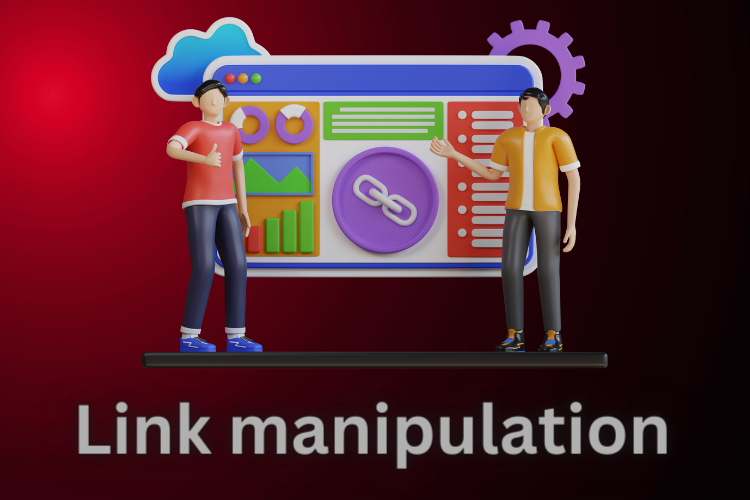In this short guide, we will learn about link manipulation, what it is, and how you can avoid it to protect your website from being penalized.
If you’re also rushing to quickly rank your website by aggressively creating black hat links, then this guide is for you.
Link manipulation definition and explanation
Link manipulation in SEO is the practice of artificially inflating a website’s ranking in search engine results pages (SERPs) by creating or acquiring links to the website in a way that violates search engine guidelines.
In simple words, link manipulation is the practice of trying to get a website to rank higher in search engine results pages (SERPs) by creating or acquiring links to the website in a way that is not natural or organic.
Link Manipulation is also known as “Black Hat Link Building” or “Unethical Link Building.”
These terms highlight the negative and unethical nature of practices that aim to manipulate search engine rankings through artificial and deceptive means.
Link manipulation can be done in many ways; some common methods are listed below:
Paid links:
Buying links from other websites is a common form of link manipulation.
This can be done directly, by paying the website owner to add a link to your site, or indirectly, by paying for advertising that includes a link to your site.

Private blog networks (PBNs):
PBNs are networks of websites that are created specifically for the purpose of creating links to other websites.
These websites are often low-quality and have little to no traffic, but they can be used to artificially inflate the ranking of other websites by creating links to them.
Link farms:
Link farms are websites that are designed to collect links from other websites.
These websites often have little to no content, and their only purpose is to provide links to other websites.
Link farms are considered to be a form of spam, and they can result in a website being penalized by search engines.
Link stuffing:
Link stuffing is the practice of adding excessive links to a website in an attempt to improve its ranking.
This can be done by adding links to the website’s text, images, and even its code.
Link stuffing is considered to be a form of spam, and it can result in a website being penalized by search engines.
Guest Posting Abuse:
While guest posting itself is not inherently bad, when it’s done solely for the purpose of gaining backlinks, with little regard for the quality or relevance of the content, it can be seen as manipulative.
Article Spinning and Linking:
Creating multiple variations of the same article (usually of low quality) and linking them to your site can be seen as an attempt to artificially increase the number of backlinks.

Comment Spam:
Leaving irrelevant or promotional comments on blog posts or forums with a link back to your site is a form of manipulative link-building.
Link Exchange Schemes:
Participating in reciprocal link exchanges where you link to a website in exchange for them linking back to you can be considered manipulative if the intent is solely to boost rankings.
Spammy Directory Submissions:
Submitting your website to low-quality or irrelevant web directories solely for the purpose of obtaining backlinks can be considered a manipulative tactic.
Link manipulation: Why Not Do It?
Engaging in link manipulation is strongly discouraged because it violates ethical guidelines and can have serious negative consequences for your website’s credibility and search engine rankings.
Search engines like Google have sophisticated algorithms that aim to provide users with the most relevant and trustworthy search results.
When you manipulate links unnaturally, you risk the following:
Search Engine Penalties:
Search engines actively identify and penalize websites that use manipulative link-building techniques. This can result in a significant drop in your website’s search rankings or even removal from search results.

Reputation Damage:
Manipulative practices can damage your website’s reputation in the eyes of both search engines and users.
If your site is associated with unethical tactics, it can erode trust and credibility.
Short-Term Gains, Long-Term Losses:
While link manipulation might yield quick gains in the short term, the penalties and damage to your reputation can have lasting negative effects on your online presence.
Wasted Resources:
Spending time and resources on manipulative practices can be counterproductive.
Instead, focusing on genuine content creation and ethical SEO practices can provide more sustainable and valuable results.
Inconsistent Performance:
Manipulated rankings are not stable or predictable.
Your website could experience sudden drops in rankings if search engines detect the manipulation.
User Experience Impact:
Manipulative practices often lead to poor user experiences due to low-quality content and irrelevant links.
This can result in decreased user engagement and trust.

Legal and Ethical Issues:
Some manipulative practices might even cross legal boundaries or violate the terms of service of other websites, leading to legal consequences.
Link manipulation: How To Avoid It?
Link manipulation is against the search engine guidelines of most major search engines, including Google, Bing, and Yahoo.
If a website is found to be engaging in link manipulation, it can be penalized by the search engines, which can result in a loss of traffic and ranking.
Here are some tips for avoiding link manipulation in SEO:
Build links naturally:
The best way to build links is to create high-quality content that people will want to link to.
This will help you to attract natural links from other websites, which will be more beneficial to your ranking than artificial links.

Be careful of paid links:
While there is nothing wrong with paying for advertising that includes a link to your website, it is important to be careful not to buy links that are clearly spammy or irrelevant.
Avoid PBNs and link farms:
PBNs and link farms are considered to be spam by search engines, and they can result in your website being penalized.
Summary
In wrapping up, link manipulation involves the practice of getting links for a website in a way that’s not natural, just to make the rank higher in search results.
But this goes against the guidelines of many major search engines.
If they detect a website (which they can easily do) engaging in link manipulation, they can penalize it, leading to reduced traffic and a lower ranking.
If you want your website to rank well in search results, it’s smart to stay away from link manipulation.
Instead, put your efforts into making really good content that people naturally want to link to.
This way, your website will have a strong base and a good chance of staying high up in search engine rankings for a long time.
More Content Related to Black Hat SEO:
